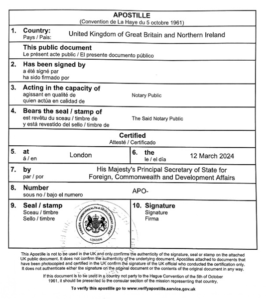FAQs
FCDO fee starting Jan 2024:
- Standard: £45, plus courier or postage costs
- Next-Day : £40, plus courier or postage costs
- Urgent service : £100, plus courier or postage costs
Scenarios for Urgent Apostille Service:
- Documents linked to repatriation that are time-sensitive.
- Veterinary document signed by a vet for transport of animals
- Documents containing evidence related to the welfare of a child or a vulnerable adult.
- Commercial Urgency (required within 48 hours). Examples:
- Certificates for insolvency searches.
- Corporate transaction documents with a specified completion date that Next-Day service cannot meet.
- Short notice private client documents.
- Visa/Asylum/Travel documents where the date of travel is within 48 hours.
According to FCDO:
Submission Deadline:
Timing: Requests must be received before 1600 the day before the required service. Note: Requests received after 1600 will be reviewed on the following day.
Objective: Our aim is to review and respond to requests on the same day.
No Late Submissions: Requests arriving after 1600 will not be reviewed until the following day. We understand the urgency in these scenarios and are committed to providing efficient and timely apostille services. Your cooperation in providing clear evidence will assist us in prioritizing and expediting the processing of your important documents.
11. What documents require solicitor’s certification before it can be legalised (can get apostille)?
The types of documents that typically require solicitor certification for legalisation are:
- Power of Attorney Documents:
- Affidavits and Statutory Declarations, sworn statements made under oath
- Commercial Agreements and Contracts including company incorporation documents, shareholders agreement, partnership agreements etc.
- Property-related Documents like deeds, leases, property sale agreements
- Educational and Professional Qualifications including degrees, transcripts, and professional certifications.
- Personal Identification Documents e.g. passport, driver’s license, personal identification docs
- Court Documents e.g. judgements, orders, divorce decrees
- Last Will and Testament
- Financial Documents e.g. bank statements, loan agreements etc.

It is permitted and possible for documents digitally signed by a UK solicitor or notary public to obtain an e-apostille for most documents provided that the electronic form of the documents is accepted by the person requesting the documents overseas. The type of signature must also be either an Advanced Electronic Signature (AES) or a Qualitative Electronic Signature (QES) for it to be accepted by the FCDO.
Certain types of documents cannot receive the e-apostille and can only receive the paper-based apostille.
- ACRO Police certificates
- ACCA membership certificates
- Disclosure Barring Service (DBS) certificates
- Disclosure Scotland or Northern Ireland certificates
- Fingerprint certificates
- General Register Office (GRO) issued certificates such as UK Birth, Death, Adoption, Marriage, Civil Partnership Certificates
If you apply directly to the FCDO, the processing time is currently 10 working days plus postage, but this can vary depending on the FCDO. During the busy season, the FCDO may require up to 20 working days to process an apostille.
If you choose to obtain an apostille through us, our processing period for our standard service is 3-5 working days, and our premium apostille service takes only 2 working days. We also offer a same-day service (restricted urgent service) but there are specific requirements that must be completed; please contact us for further details.
A solicitor does not issue an apostille, but they can certainly assist in obtaining one on your behalf. Some solicitors and notary publics are familiar with the apostille process and may be able to help legalise your documents. However, the process may take a few weeks as they may not have the necessary procedures or tools for quick processing.
How long is an apostille valid till?
Apostille certificates are considered indefinite as they do not have an expiry date. Once issued, they are typically accepted at any time and in any country that is a member of the Apostille Convention.
UK birth certificates typically require an apostille when registering a birth in another country or verifying one’s identity. Most birth certificates, usually printed in black and green or black and red ink, bear the signature of a local registrar or the stamp of the government registry office.
Legalisation of photocopies of birth certificates is not viable; solely original certificates or replacement copies issued by the registry office are acceptable. Even if a photocopy is endorsed by a solicitor or notary public, apostille issuance for photocopies is not permitted.
An alternative to the apostille would be something called consular legalisation or embassy legalisation. This involves obtaining authentication or legalisation of documents from the embassy or consulate of the country where the documents will be used. The specific requirements and procedures for consular legalization vary depending on the country and its diplomatic missions. It’s typically used for countries that are not part of the Hague Apostille Convention or for documents that require further authentication beyond the apostille.
However, the popularity of apostilles has grown, leading to requests for them even in countries not part of the Apostille Convention. In such cases, apostilles may be required for further attestation at respective embassies.

